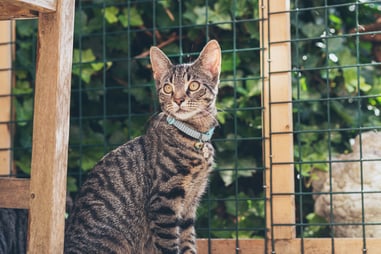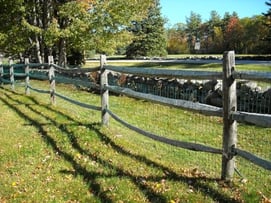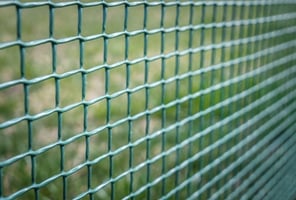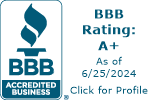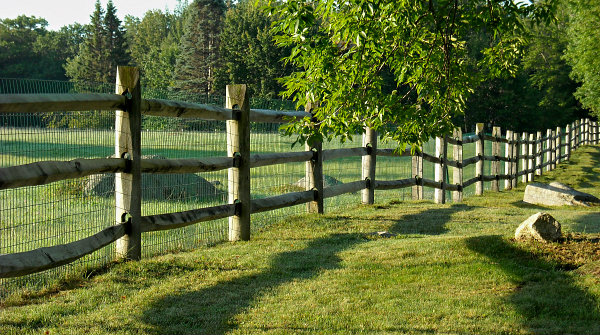
Delaying Rust and Corrosion
Vinyl Coated (VC) welded wire mesh has been coated with a layer of PVC after the mesh has been welded. This is significant because the vinyl covers the mesh and provides protection against the elements. Rust and corrosion are delayed much longer than with an unprotected Galvanized Before (GBW) mesh.
- The good news - extended lifetime and attractive appearance
- The bad news - more expensive than non-vinyl coated material
- The reason - addition of PVC coating provides an impervious barrier, protecting the underlying wire from the environment. The protected wire will not rust as quickly.
Looking for a product that is not only attractive but is also able to withstand environmental stresses? VC wire mesh is the perfect one to use!
Wire Gauges, Mesh Openings
It is very important to not only know what to look for, but also what is available when considering VC welded wire fencing materials. There are many choices - something ideal for any project you have in mind.
Wire Gauges: 23, 19, 16, 14, 12-1/2, 11, and 10-1/2
Mesh Sizes: 1/4" x 1/4", 1/2" x 1/2,", 1/2" x 1", 1" x 1", 1" x 2", 1-1/2" x 1-1/2", 1-1/2" x 4", 2" x 2", 2" x 3", 3" x 2", 2" x 4", 3" x 3"
Beware of Inferior Products
Higher quality vinyl coated fencing material costs more than cheaper inferior products. You get what you pay for. People are often fooled by false economy. When you consider the time, hassle and additional expense of premature replacement of your fence, it is clear that a higher initial investment can ultimately save you money.
It is safe to say that the best possible protection and longest life expectancy is offered by a product that is vinyl coated over GAW (Galvanized After Weld) wire mesh. You have rugged double protection with both the zinc and the PVC coatings. While difficult and probably impossible to find in big box retail stores, this mesh is well worth the time and effort of a search. You will not be disappointed. Many, but not all specifications are available with GAW core wires.
Understanding Levels of Quality
If you are concerned with quality, be aware that there are different levels of quality available.
The lowest quality products are those that have coating over plain steel, non-galvanized wire. There is no protective layer of zinc on the wire. In this case, the coating is virtually worthless. Usually, the PVC is not tightly bonded to the underlying wire. It can often be easily scraped off the wire with nothing more than a fingernail. Moisture migrates in between the vinyl and the wire and the mesh rusts from the inside out. It will look fine on the outside when you load it in your shopping cart. But when the wire disintegrates and falls apart you have a mess. Hopefully, this never happens to you.
The next best quality of vinyl coated welded wire meshes are those that have GBW (Galvanized Before Weld) wire under the PVC. The galvanizing protects the wire. But the intersecting areas of the mesh where the welds occur are not well protected. During the welding process, the zinc is burnt away. Although zinc will "flow back" in an attempt to recover the areas, they are the first areas to decay and corrode. It is important to check out how securely the vinyl is attached to the wire. It may or may not be tightly bonded. If you can peel it off with a fingernail, it probably will not last as long as fencing material with a superior coating.
As mentioned above, the best quality products are those with the following characteristics: 1) GAW wire mesh is underneath the PVC; 2) the vinyl is tightly bonded to the wire. The welded areas are thoroughly protected and the vinyl is not easily scraped off the wire. The vinyl coated welded wire fencing material with these characteristics are what you need if you want years of trouble-free service. It is worth the effort required to find them.
A Test for You to Do
The only sure way, though not always possible or recommended, is to try scraping off a small section of vinyl. If you can start it with your fingernail and slide the coating along the wire (see picture below) you know the coating is not tightly bonded. If the coating resists peeling and requires a sharp blade to scrape it off, you will know the coating is tightly bonded.
If the underlying wire is dark gray or black, this means there is plain steel beneath the coating. Make sure this is the product you really want to buy.
If the wire is bright and shiny it is galvanized. Check out the intersecting weld areas. If you see burns and blackened wire it is GBW. This is an example of non-bonded vinyl coating over GBW wire:
Clumping that You Want!
If the wire is bright and shiny and the welded areas have clumps of zinc around them, the mesh has been galvanized after. This is what GAW mesh looks like:

Check in with Louis Page
Keep in mind that you do have choices and do not have to settle for the products that are right in front of you, especially if they are (or might be) inferior. Be aware that the person working in the store probably knows less than you do about the differences in products and why a different item may be more suited to your needs. Consulting with the experts at Louis Page is a necessary first step.
![]()




